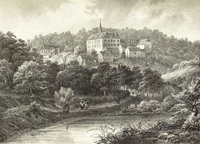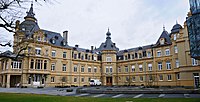
Luxembourg, also known as Luxembourg City, is the capital city of Luxembourg and the country's most populous commune. Standing at the confluence of the Alzette and Pétrusse rivers in southern Luxembourg, the city lies at the heart of Western Europe, situated 213 km (132 mi) by road from Brussels, 372 km (231 mi) from Paris, and 209 km (130 mi) from Cologne. The city contains Luxembourg Castle, established by the Franks in the Early Middle Ages, around which a settlement developed.
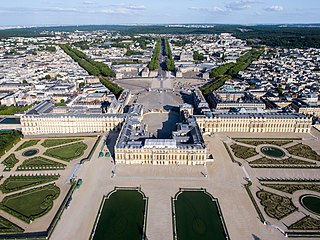
A château is a manor house or residence of the lord of the manor, or a fine country house of nobility or gentry, with or without fortifications, originally, and still most frequently, in French-speaking regions.

RTL is a French commercial radio network owned by the RTL Group. Founded in 1933 as Radio Luxembourg, it broadcast from outside France until 1981 because only public stations had been allowed until then. It is a general-interest, news, talk and music station, broadcasting nationally in France, Francophone Belgium, and Luxembourg. Until 2022, RTL was also broadcast on long wave frequency 234 kHz from Beidweiler which could be picked up in large parts of the continent. It has a sister station called Bel RTL tailored for the French Community of Belgium. As of 2018, RTL is France's most popular radio station with an average of 6.4 million daily listeners that year.

Bettembourg is a commune and town in southern Luxembourg. The country's eighth-most populous commune, it is part of the canton of Esch-sur-Alzette.

Differdange is a commune with town status in south-western Luxembourg, 17 miles (27 km) west from the country's capital. It lies near the borders with Belgium and France and it is located in the canton of Esch-sur-Alzette. With a population of around 29,500, Differdange is the country's third largest city. It is also the main town of the commune, and other towns within the commune include Lasauvage, Niederkorn, Fousbann, and Oberkorn.
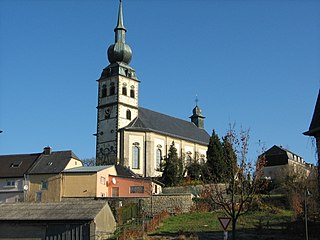
Koerich is a commune and village in western Luxembourg. It is part of the canton of Capellen.
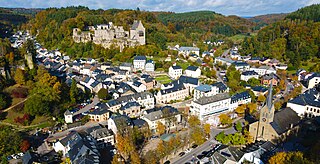
Larochette is a commune and town in central Luxembourg, in the canton of Mersch. It is situated on the White Ernz river. The town is dominated by the partly ruined Larochette Castle.
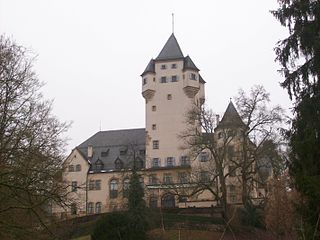
Berg Castle is the principal residence of the Grand Duke of Luxembourg. It is situated in the town of Colmar-Berg, in central Luxembourg, near the confluence of the Alzette and the Attert, two of Luxembourg's most important rivers.
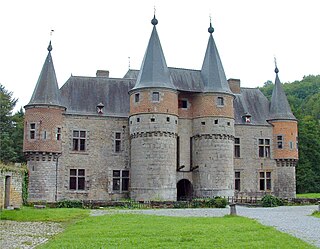
Spontin Castle is a medieval castle in the village of Spontin in the municipality of Yvoir, province of Namur, Wallonia, Belgium. It has massive walls, its towers topped with slate and a moat with drawbridge.

Luxembourgish art can be traced back to Roman times, especially as depicted in statues found across the country and in the huge mosaic from Vichten. Over the centuries, Luxembourg's churches and castles have housed a number of cultural artefacts but these are nearly all ascribed to foreign artists. The first examples of art with a national flavour are paintings and maps of the City of Luxembourg and its fortifications from the end of the 16th until the beginning of the 19th century, although these too were mostly created by foreign artists. Real interest in art among the country's own citizens began in the 19th century with paintings of Luxembourg and the surroundings after the country became a grand duchy in 1815. This was followed by interest in Impressionism and Expressionism in the early 20th century, the richest period in Luxembourg painting, while Abstraction became the focus of art after the Second World War. Today there are a number of successful contemporary artists, some of whom have gained wide international recognition.

Differdange Castle, located on a hill in the centre of Differdange in southern Luxembourg, was built in 1577 although an earlier fortified castle of Differdange dates from around 1310. Today's residential château is used by Miami University.
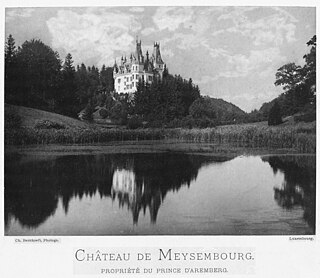
Meysembourg Castle is located some 2 km south-west of Larochette in central Luxembourg. While the site has a history dating back to the 12th century, today's castle was built in 1880 in Neo-Renaissance style and is privately owned.
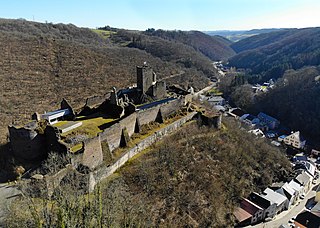
Brandenbourg Castle, now a ruin, is located on a promontory some 70 metres above the village of Brandenbourg in north-eastern Luxembourg. It has a history going back to the 9th and 10th centuries when there was a wooden fort on the site. The 13th century keep, now 11.9 metres high, used to have four floors, only three of which remain. Around 1687, the French destroyed the external walls of the castle which subsequently fell increasingly into ruin. It is now owned by the family du Fays - van Delft. The owner signed an emphyteutic lease (1997) with the State of Luxembourg permitting the state to take care of the castle.
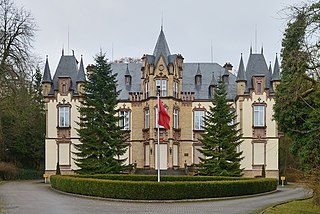
Dommeldange Castle is located in Dommeldange, the most northerly quarter of Luxembourg City in the Grand Duchy of Luxembourg. Initially a private residence built for the owner of the local iron works, it is now the Embassy of the People's Republic of China.

Walferdange Castle, located in the small town of Walferdange in central Luxembourg, dates from 1824, when William I of the Netherlands, who was also Grand Duke of Luxembourg, built it as a stud farm. It was a part of the University of Luxembourg and since 2015 has been used by the Ministry of National Education, Childhood and Youth (Luxembourg).

Senningen Castle is a revival-style castle, located in the town of Senningen, in the west of the commune of Niederanven, in the Grand Duchy of Luxembourg. Today it is used by the State for official meetings.

Wintrange Castle, located in the centre of Wintrange near Schengen in south-eastern Luxembourg, is a privately owned Renaissance style castle built in 1610 and can be rented for weddings, events, film, and photo location.

Munsbach Castle is located to the west of Munsbach, in the Schuttrange commune, east of Luxembourg city. Built in 1775 in the Baroque style, the main building was originally used as a manor for a long time, before it was transformed into a castle at the end of the 19th century, with the addition of two towers and a number of independent buildings.
On 23 January 1955 the privately owned Compagnie Luxembourgeoise de Télédiffusion (CLT) launched Luxembourg's first television channel, the French-language Télé Luxembourg.

Birtrange Castle is a castle near Schieren, Luxembourg.






















